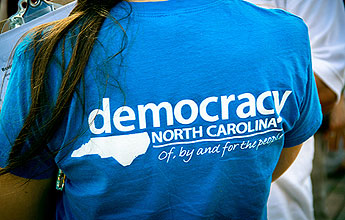‘Moral Mondays’ Protest N.C. Legislation
June 21, 2013
Some say religion and politics don’t mix. But politicians often call upon their religion as an inspiration or justification for their actions. Nowhere is this truer than in North Carolina, where both houses of the state legislature are under Republican control by Tea Party conservatives who often cite scripture to support their agenda.
During the current legislative session, those lawmakers have blocked the expansion of Medicaid, instituted discriminatory voter ID laws and are proposing cutting state unemployment benefits, depriving 70,000 residents of essential financial support.
Where do the actions of these legislators fall on the moral compass of Christianity? Due south, say hundreds of members of five major Christian denominations who have been showing up in Raleigh every Monday since April 29 to protest against right-wing legislation and a regressive proposal that would cut taxes on the top 5 percent while raising them on the other 95 percent.
“Moral Mondays,” they call the protests—which are led by clergy and have combined prayer with civil disobedience that has resulted in nearly 500 arrests. Jack Jenkins, a guest blogger on Think Progress, says many of the clergy have never before participated in political activism.
“When laws are most harmful to the most vulnerable, clergy who are committed to a biblical vision of peace and justice ought to start paying attention,” Rev. Franklin Golden, co-pastor of Durham Presbyterian Church in told Think Progress.
 “These folks have lost their constitutional minds and their moral minds,” the Rev. William J. Barber II, the president of the North Carolina N.A.A.C.P., told the New York Times. “We can no longer allow the ultraconservatives to have the moral megaphone.”
“These folks have lost their constitutional minds and their moral minds,” the Rev. William J. Barber II, the president of the North Carolina N.A.A.C.P., told the New York Times. “We can no longer allow the ultraconservatives to have the moral megaphone.”
Moral Monday activists hope that the energy generated in weekly protests will spill into grassroots activity on the electoral front in 2014.
“We’re going to make sure that the contrast is so clear between meanness and immorality and extreme politics and the politics of love and justice and compassion, that when 2014 comes, the people will be able to make a decision,” said Barber, in an interview in The American Prospect.
David Haynes, IBEW Membership Development Department North Carolina lead organizer and former state political director, says one of the first pieces of legislation introduced in the state after the Republican majority was seated called for amending the state’s constitution to incorporate an anti-labor “right to work” clause.
“We’re the least-organized state in the U.S.,” says Haynes, who adds that labor activists are planning to step up efforts to support Moral Mondays as part of a long-term struggle to reverse the damage done by a governor and state legislators who have redrawn voting districts to thwart any movement to change their agenda.
“The IBEW applauds the courageous actions of hundreds of members of North Carolina’s communities of faith in standing up for fairness and economic justice for the state’s working families,” says International President Edwin D. Hill.
NAACP Pres. Holding young child:
Photo used under a Creative Commons license from Flickr user gnuru.
T-shirt
Photo used under a Creative Commons license from Flickr user yashmori .